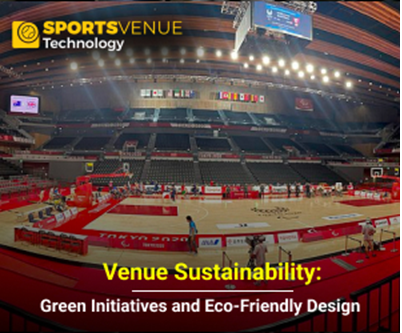Venue Sustainability: Green Initiatives and Eco-Friendly Design

In an era where the pressing issue of environmental conservation has garnered heightened attention, the concept of sustainability has gained prominence across various sectors. Event venues, encompassing sports stadiums, convention centers, and concert halls, are no exception to this paradigm shift. Their substantial environmental footprint, stemming from their vast scale, energy consumption, and waste production, underscores the need for change. Nevertheless, there is a burgeoning movement focused on transforming event venues into more eco-friendly spaces, driven by green initiatives and environmentally conscious design.
A) Understanding Venue Sustainability
Venue sustainability is all about making sure that event spaces have a minimal negative impact on the environment. This involves reducing waste, energy consumption, and carbon emissions while also considering the well-being of attendees and the local community.
B) Eco-Friendly Design
One of the primary ways venues can promote sustainability is through eco-friendly design. This involves planning and constructing the venue in a way that minimizes its impact on the environment. Here are some key aspects of eco-friendly design:
1. Location and Transportation
Choosing a location accessible by public transport or close to urban areas can encourage attendees to use eco-friendly transportation options, reducing the carbon footprint of the event. Additionally, providing bicycle racks and electric vehicle charging stations can further promote sustainable transportation.
2. Energy Efficiency
Event venues consume a significant amount of energy, mainly for lighting, heating, and cooling. To reduce this energy usage, venues can install energy-efficient lighting, heating, and cooling systems. These systems are not only better for the environment but can also lower operating costs.
| Also Read: Dynamic Dimensions: Exploring the World of Sports Architectural Design |
3. Environmentally Responsible Construction Materials
Opting for sustainable building materials like recycled steel, bamboo, or reclaimed wood can effectively lessen the environmental consequences of construction. Additionally, the application of low Volatile Organic Compounds (VOC) paints and finishes plays a crucial role in enhancing indoor air quality.
4. Water Conservation
Water is a precious resource, and event venues can contribute to water conservation by installing low-flow faucets and water-efficient landscaping. Collecting and reusing rainwater for irrigation is another eco-friendly option.
5. Living Roofs
Living roofs are gaining momentum in environmentally conscious venue architecture. These rooftops are adorned with vegetation, offering not only an appealing aesthetic but also insulation that curtails the energy needed for heating and cooling.
C) Green Initiatives
Apart from eco-friendly design, there are various green initiatives that venues can undertake to reduce their environmental impact. These initiatives are often ongoing efforts and can make a significant difference in the long run:
1. Waste Minimization and Recycling
Event venues can establish extensive waste reduction initiatives, encompassing recycling, composting, and the adoption of reusable products. These measures effectively decrease the volume of waste directed to landfills and promote resource conservation.
2. Eco-Friendly Food and Beverage Practices
Sourcing local, organic, and sustainably produced food and beverages for events can reduce the carbon footprint associated with catering. Additionally, eliminating single-use plastic and opting for biodegradable or reusable tableware can significantly reduce waste.
3. Energy Conservation
In addition to mindful design, event venues can further enhance their energy efficiency by investing in renewable energy sources such as solar panels and wind turbines. These endeavors not only lead to cost savings but also contribute to a significant reduction in the venue's carbon emissions.
4. Green Certifications
Many organizations offer green certifications for event venues, signifying their commitment to sustainability. Achieving these certifications demonstrates a venue's dedication to eco-friendly practices and can attract environmentally-conscious clients.
5. Community Engagement
Engaging with the local community is an essential aspect of venue sustainability. This can involve supporting local environmental initiatives, providing space for community events, or even opening the venue for educational programs about sustainability.
D) The Benefits of Venue Sustainability
There are numerous benefits to making event venues more sustainable. First and foremost, it helps protect the environment by reducing energy consumption, waste, and carbon emissions. But there are also several other advantages:
1. Cost Savings: Energy-efficient systems and waste reduction programs can lead to significant cost savings over time.
2. Reputation: Venues with strong sustainability initiatives often attract environmentally-conscious clients, enhancing their reputation.
3. Regulatory Compliance: Many areas are implementing regulations related to sustainability, and venues that are proactive in this area will be well-prepared for any legal requirements.
4. Attendee Experience: Sustainable venues provide a more pleasant and healthy environment for event attendees, which can enhance their overall experience.
E) Engaging the Event Industry
To truly make a difference in venue sustainability, it's crucial to engage the entire event industry. Event organizers, exhibitors, and attendees all play a role in minimizing the environmental impact of events. Event organizers can encourage sustainable practices by providing guidelines for exhibitors and attendees, such as reducing printed materials, using digital signage, and minimizing waste. Exhibitors can adopt eco-friendly booth designs, offer sustainable giveaways, and consider the environmental impact of their products and marketing materials. Attendees, on their part, can contribute by carpooling or using public transport, bringing their reusable water bottles and containers, and participating in recycling and composting programs offered by the venue.
F) Challenges and Obstacles
While the benefits of venue sustainability are clear, there are challenges and obstacles to overcome. The initial cost of implementing eco-friendly design and green initiatives can be a barrier for many venues. However, it's important to recognize that these investments often result in long-term savings and increased revenue. There may also be resistance to change from staff and stakeholders who are comfortable with traditional practices.
Furthermore, attaining sustainability objectives may necessitate alterations to regional regulations and construction standards, often entailing a protracted and bureaucratic procedure. Nonetheless, venues dedicated to sustainability can serve as role models and proponents for driving constructive alterations in these domains, exerting influence on both their industry and the local community.
G) A Brighter, Greener Future
In the face of climate change and environmental challenges, venue sustainability is no longer an option; it's a necessity. Event venues can be powerful catalysts for change, leading the way in adopting eco-friendly design and green initiatives. By doing so, they not only reduce their environmental footprint but also inspire others in the event industry and the broader community to take action. As technology advances and sustainability practices become more accessible and cost-effective, the future of event venues is looking brighter and greener. Through collective effort, we can create spaces where people can gather, celebrate, and learn in a way that respects the planet and benefits everyone.
| Also Read: The Impact of Venue Audiovisual Solutions: Enhancing the Game Experience |
Conclusion
In conclusion, prioritizing venue sustainability through eco-friendly design and green initiatives is a crucial imperative in the contemporary world. Event venues, owing to their substantial environmental footprint, can make a profound difference through meticulous planning and sustained commitment. Notably, eco-friendly design and green initiatives yield advantages beyond environmental preservation, including cost efficiencies and the cultivation of a favorable reputation. Moving forward, it remains imperative for event venues to wholeheartedly embrace sustainability, thus taking the lead in the collective endeavor to safeguard our planet.





